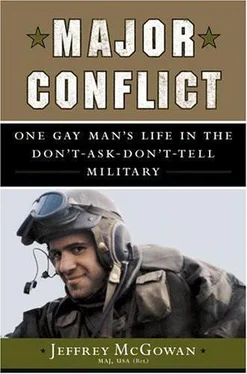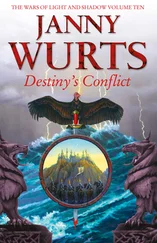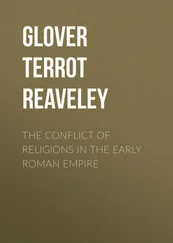This little dalliance with Eileen went on until I went off to ROTC Advanced Camp in July. The night we said good-bye I think it was clear to both of us that when I returned in August and when we got back to school in the fall, we’d probably not be an item. We’d had a good run, but I think she sensed the limits of my affection early on and, sensing them, had limited her own. Still, I firmly believed that it was just a matter of finding the right girl, and that someday I’d find her and marry her and we’d have kids and the whole bit. I didn’t know it at the time, but this little spring-into-summer affair with Eileen would actually be my last shot at that, since it would be my last relationship with a woman.
Having said good-bye to Eileen, I went off to Advanced Camp. One of the most exciting things for me during college was experiencing what it was like to be in the field as a soldier. Every year up to this point we’d been sent to West Point for a weekend training exercise. These training exercises and our weekly classes were basically preparation for what is now called National Advanced Leaders Camp. When I went, though, it was called simply Advanced Camp.
Scheduled during the summer between the ROTC cadet’s junior and senior years of college, it is the culmination of everything the cadet has learned up to that point and, more important, serves as an evaluating tool for the military. Cadets are rated on a scale of one to five, a one meaning you’re simply not cut out to be a soldier, a five meaning you’re the cadet equivalent of an Eisenhower. This score plus your GPA determines whether or not you’re placed on active duty. The camp also gives the cadet the chance to experience a little bit of every branch of the army so that he or she can decide where they most want to serve.
Today the camp is held only at Fort Lewis, Washington, but when I went they had Advanced Camp at Fort Bragg, North Carolina, as well. I was sent to Fort Bragg. The whole experience was a nonstop adrenaline rush: constant activity played to a loud hard-rock sound track that included songs like “Rock You Like a Hurricane” and “Hell’s Bells.” Typical components were: Basic Rifle Marksmanship, Fire Support, Machine Gun Training, Hand Grenade Assault Course, and Confidence Training (Rappel, Obstacle Course, etc.).
It was at Advanced Camp that I first developed my lifelong obsession with being a paratrooper. The Eighty-second Airborne assigned a brigade to Advanced Camp every year. It was with the Airborne that I formed my first real impression of the army away from cadet land and a better appreciation of what I was in for if I wanted to go on active duty.
The most powerful experience I had while at Advanced Camp occurred about halfway through the course. It was a hot and clear Carolina day. As we made our way through an obstacle course on one of the western ranges, it felt as if the sun were getting closer to us with each step, beating down on us without mercy. In addition to the heat, this particular obstacle course made the afternoon feel like a crucible in which we were being tested mightily. The course included a timed portion that took us through a deep, muddy trench lined on both sides by sergeants barking at us like mad dogs. Coming out of the trench, I found myself covered head to toe in filth and smelling pretty bad, but feeling, somehow, exhilarated, as if I’d reached a new level of endurance. After the trench, there was a five-story tower. As we’d been instructed, I climbed to the top and slid down the long wire on the other side, letting go at just the moment we’d been trained to, and dropping down into the cool stream below. It was great to be in the water, feeling all the dirt slide off my tired, sweaty body. I relaxed for a moment and tried to actually enjoy it until one of the cadre above started yelling at me to get out of the way so that the guys behind me didn’t fall on top of me. As I swam downstream to the rendezvous point I suddenly heard behind me at the drop point a loud crack followed by a dull kind of thud. I turned back to the hanging wire and saw, on the jagged outcrop of rock that stuck out just below the tower, the crumpled body of a cadet who must’ve been just behind me. I waited for him to stand up, to roll over, anything, but he just lay there motionless, and I started getting an awful sinking feeling in my gut. I tried to see if I recognized him, but the way his body was twisted away from me I couldn’t make out a face. I was frozen there in the cool stream, treading water, transfixed by the scene transpiring in front of me. “Get up, get up, fuckhead, get up,” I heard myself saying, under my breath, pushing the water out around me harder and harder. But he still wasn’t moving, and I began to realize it was probably very, very serious. I can’t remember how long I stayed there, treading that black water. I remember thinking, I can’t move; I can’t look away, until he moves, until he gets up. But he didn’t move, no matter how much I willed him to, and the water seemed to grow colder and colder until I started losing feeling in my feet. Just as they reached him and began to survey his injuries and take his vitals, making sure not to move his body, I was yanked out of my state by the brusque voice of one of the cadre yelling at me to come out of the water and get with the group.
I swam downstream. The sight of the kid’s body so impossibly arrayed across the rocks was terrifying. The image of his young, twisted body was immediately seared into my mind. I had never seen anything like it before, nothing even close, and I found myself getting a little queasy and a little short of breath as I pulled my body out of the water and joined the rest of the group. We sat silent, shivering, crestfallen, all the young, male energy that had filled the air just a few moments ago having instantly vanished. Deflated, barely able to look at one another, we waited quietly as they retrieved the boy’s body from the rocks. At one point I turned my head away from the recovery scene and looked at my fellow cadets sitting around me. Just a few moments earlier their faces had been the faces of young, vibrant men, invincible, eager to take on the world. Now all I saw were boys, little boys, some fighting tears, faced for the first time with evidence of their own mortality, evidence of their own limits, and most of all, the hard cold evidence of one of the most sobering realities of army life.
After about a half hour, without any sort of explanation, they moved us downstream to the next site. It was hard, of course, to recapture the energy we’d had before the accident, to reinflate ourselves, so to speak, but that seemed to be what they expected, so we all did our best. As the afternoon progressed, the heavy-metal music they played through the loudspeakers to pump us up seemed callow and crass, a kind of mockery of the boy whose fate was still entirely unknown to us. I was distracted and sluggish the rest of the afternoon, unable to shake the image of the boy on the rock from my mind, and increasingly angered by the total silence coming from on high regarding the incident. By the end of the day I was so worked up that for the first time I found myself questioning whether or not I actually wanted to be an officer, whether or not the army life was actually the life for me.
That evening the sergeant in charge of our platoon called a meeting to discuss the day and to assign the next day’s leadership positions. Before he could even start he was bombarded with questions about the accident. He tried to update us on the injured cadet’s condition and what had apparently caused the mishap, but we were all too worked up to absorb his rather clinical explanation. We started talking among ourselves, recounting our own reactions and thoughts. We were all feeling a little bit raw that night, some of us almost tearyeyed, and more clumsy with our feelings than usual. We needed more than the normal cut-and-dried response. The sergeant seemed to get it and listened to us patiently, murmuring reassurances, and when the geyser of emotion seemed to have run its course, he got straight to the point about the boy on the rock.
Читать дальше












